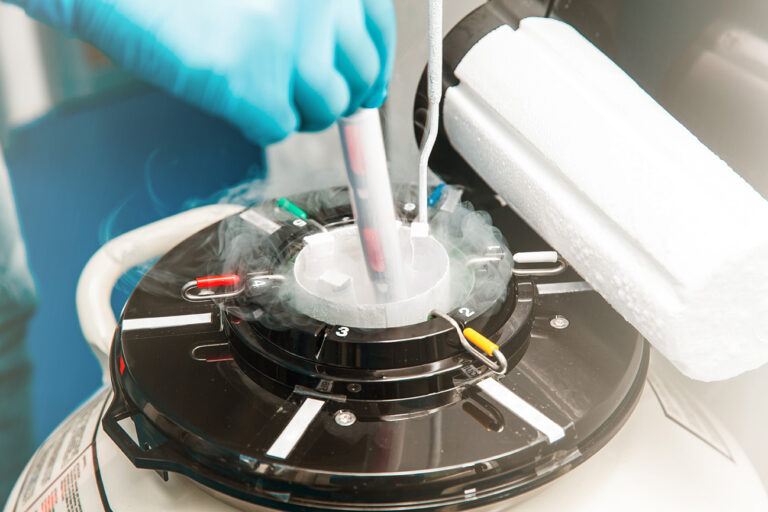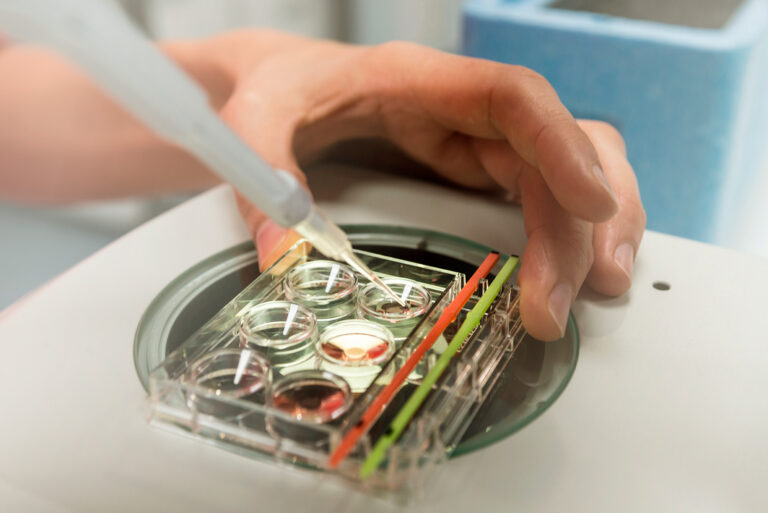Ovodonation
Your dream doesn’t stop. The solidarity of others makes it possible.


What does it consist of?
Ovodonation is indicated when the chances of achieving a pregnancy using one’s own oocytes is very low or its use is impossible due to the absence of the same or some other conditions that contraindique its use. This involves In Vitro Fertilisation of oocytes from a donor. Once fertilised in the laboratory, the procedure is the same as in any other IVF. The embryos are cultured for a few days and then transferred to the woman’s uterus.
At Next Fertility we have a gamete bank that offers the best guarantees and complies with all the recommendations of the main national and international scientific societies. All our donors undergo an exhaustive series of medical, genetic, and psychological tests before being admitted to our egg donation program.
According to the origin of the semen sample:
- Egg donation with couple sperm. The sperm come from a semen sample from the patient’s partner.
- Egg donation with donor sperm. The semen comes from a gamete bank.

When is it indicated?
- Advanced maternal age.
- Early menopause or premature ovarian failure.
- Absence of ovaries: congenital or after surgical removal.
- Repeated failures of other assisted reproduction techniques.
- Contraindication of the use of own oocytes, due to a hereditary genetic disease, capable of being transmitted to the offspring and which cannot be prevented by the use of Embryonic Genetic Diagnosis Techniques (PGT).
- Others.
Donor selection
This is done according to the phenotypic characteristics of the egg recipient, taking into account her blood type. We can also offer the opportunity to carry out a “genetic matching” (genetic compatibility test), further reducing, if possible, the chances of passing on a genetic disease to offspring, since all our donors undergo an exhaustive series of clinical, genetic and psychological tests.
Preparation of the semen sample
It is necessary to prepare the semen sample so that it has the capacity to fertilize the egg, in addition to achieving an optimum concentration of mobile sperm.
The semen sample is obtained by the man by simple masturbation at our centre on the same day as the insemination, or it can be cryopreserved beforehand. In cases where the use of donor sperm is indicated, this sample will always be frozen and stored in our sperm bank. In both cases, our embryologists will treat the sample in the laboratory through a process known as sperm capacitation, in which we can select the sperm with the best mobility.
Fertilization and culture
Our embryologists perform fertilization through a technique called ICSI (Intracytoplasmic sperm injection). It consists of the selection of a single sperm for each egg that is microinjected into it. It is a very precise technique that favors the fusion of the nuclei of the male gamete with the female. Fertilized embryos must be kept in culture for 5-7 days. And during this time, they will develop until they reach the blastocyst stage.
In Next Fertility, we use time-lapse technology, which allows real-time monitoring of the evolution of embryonic development. This way, we evaluate in a very exhaustive way the morpho-kinetic changes that take place and this allows us to select the embryos most likely to get a pregnancy.
Endometrial preparation
The objective of this phase is to prepare the endometrium of the patient to maximize the possibilities of embryo implantation. It is performed with the administration of estrogen and progesterone preparations, which contribute to the correct development of the endometrium, which is the layer of the uterus where the embryo will implant and the future baby will develop during its intrauterine life.
During this phase ultrasound checks and hormonal determinations are made to check the correct preparation of the endometrium.
Embryo Transfer
In the embryo transfer we will deposit the embryo inside the uterine cavity; this can be done in “fresh” or in “deferred”.
The transfer is done with an embryo in blastocyst stage (5-7 days of embryonic life), is called in “fresh” when it is done with a blastocyst without having been frozen previously, during the same cycle of ovarian stimulation and follicular puncture; and in “delayed” when a thawed blastocyst is transferred, in a cycle after the in vitro fertilisation treatment cycle.
The transfer is made “deferred” when: a) there is a risk of “Ovarian hyperstimulation syndrome”, b) endometrial conditions are not adequate for embryonic implantation, c) it is necessary to perform embryonic genetic diagnosis techniques, d) there is some reason why gestation in the same IVF cycle is not advisable.
In both cases, the transfer is done with a transfer tube or catheter, using an ultrasound guide. This procedure is completely painless and does not require hospital admission.
Pregnancy Test
A blood pregnancy test will be carried out 14-15 days after insemination. It will look for the presence of the hormone β-hCG (human chorionic gonadotrophin), which is the hormone produced by the embryo after its implantation in the endometrium.
If the test result is positive, an ultrasound will be carried out around 2 weeks later to confirm the presence of the “gestational sac” inside the uterus and to observe the heartbeat of your future baby. From this point on, your regular gynaecologist can monitor the pregnancy.
Any more questions? We will be happy to help you.
Get in touch with us and we will solve all your doubts about our treatments, techniques and promotions.




